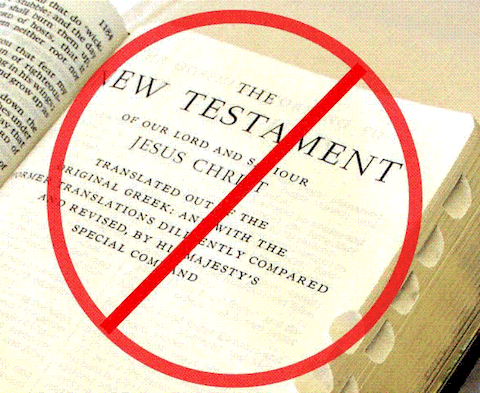
1001 Errors in the Christian Bible
Home
Dedication
Matthew
Mark
Luke
John
Acts
Contact Us
John -- Errors 551-557
#551
John 7: (KJV)
42 “Hath not the scripture said, That Christ cometh of the seed
of David, and out of the town of Bethlehem, where David was?”
Compare to Micah 5: (JPS)
1 “But thou, Beth-lehem Ephrathah, which art little to be among
the thousands of Judah, out of thee shall one come forth unto Me that
is to be ruler in Israel; whose goings forth are from of old, from ancient
days.”
The reference in Micah refers to the clan of David, Beth-lehem Ephrathah,
and not the city of Bethlehem.
# 552
John 7: (KJV)
53 “And every man went unto his own house.”
The manuscript evidence indicates that John 7:53-8:11 is not original
but that doesn’t stop a majority of moderns from showing it with
no explanation.
# 553
John 8: (KJV)
20 “These words spake Jesus in the treasury, as he taught in the
temple: and no man laid hands on him; for his hour was not yet come.”
Applause. Nice literary touch showing Jesus’ “teachings”
as the treasure in the Temple. Note that up to this point in John the
“teachings” have been non-specific and “John” has
been primarily one long infomercial for all things Jesus. The “in”
from “in the treasury” though is a problem because the treasury
was a storage area so no one would have been teaching in it. The Greek
word has a lesser meaning of “by” which would make the sentence
possible but a majority of moderns have chosen art over reality by using
“in”.
# 554
John 8: (KJV)
25 “Then said they unto him, Who art thou? And Jesus saith unto
them, Even the same that I said unto you from the beginning.”
The underlying Greek says “Jesus the beginning the one and speak
to you”. Not a complete sentence. A good guess for the meaning is,
“I’m the same as the one who spoke to you from the beginning”.
Interestingly, “the Jews” finally ask Jesus a sincere and direct
question and Jesus tries to give a sincere and direct answer. But instead
of sounding like God he sounds like Tarzan. Kind of like when the Fonz
tried to say he was “wrong”. “I was wung, I wuz wring,
I was wah, wah, whong”.
# 555
John 8: (KJV)
38 “I speak that which I have seen with my Father: and ye do that
which ye have seen with your father.”
There is textual variation for almost every word here. One of the few
things that can be said with certainty is that the manuscript evidence
indicates there is no “your” before the second “father”
even though almost every modern adds it. Now you know why there is so
much textual variation for this sentence. Adding “your” here
implies that “the Jews” have a different father than Jesus has,
the devil. Translators should be more careful as indicating an entire
group of people have the devil as their father when the underlying text
says no such thing could lead to a Holocaust or something.
# 556
John 8: (KJV)
39 “They answered and said unto him, Abraham is our father. Jesus
saith unto them, If ye were Abraham's children, ye would do the works
of Abraham.”
A famous line. A not so famous mistranslation. The manuscript evidence
says “are” for “are Abraham's children” and not “were
Abraham's children” which a majority of moderns have. The entire
sentence has significant textual variation which normally means whatever
was originally written was changed. “Were” reflects later Christian
theology that the Jews were no longer the chosen people.
# 557
John 8: (KJV)
41 ”Ye do the deeds of your father. Then said they to him, We
be not born of fornication; we have one Father, even God.”
“God” has a “the” before “God” here which
none of the moderns I saw have. If the Father is “the” God then
Jesus isn’t. Let the reader understand.